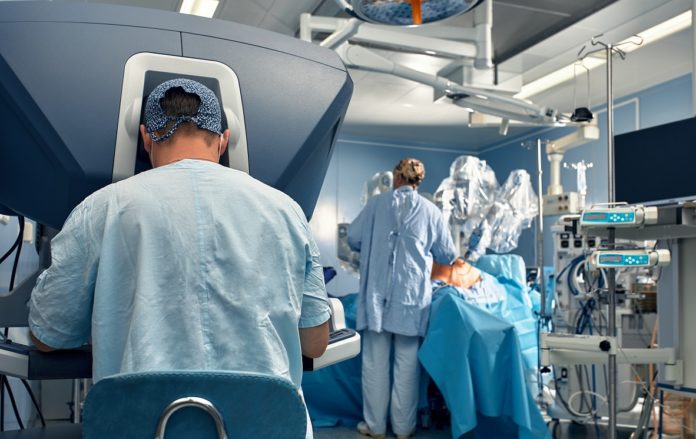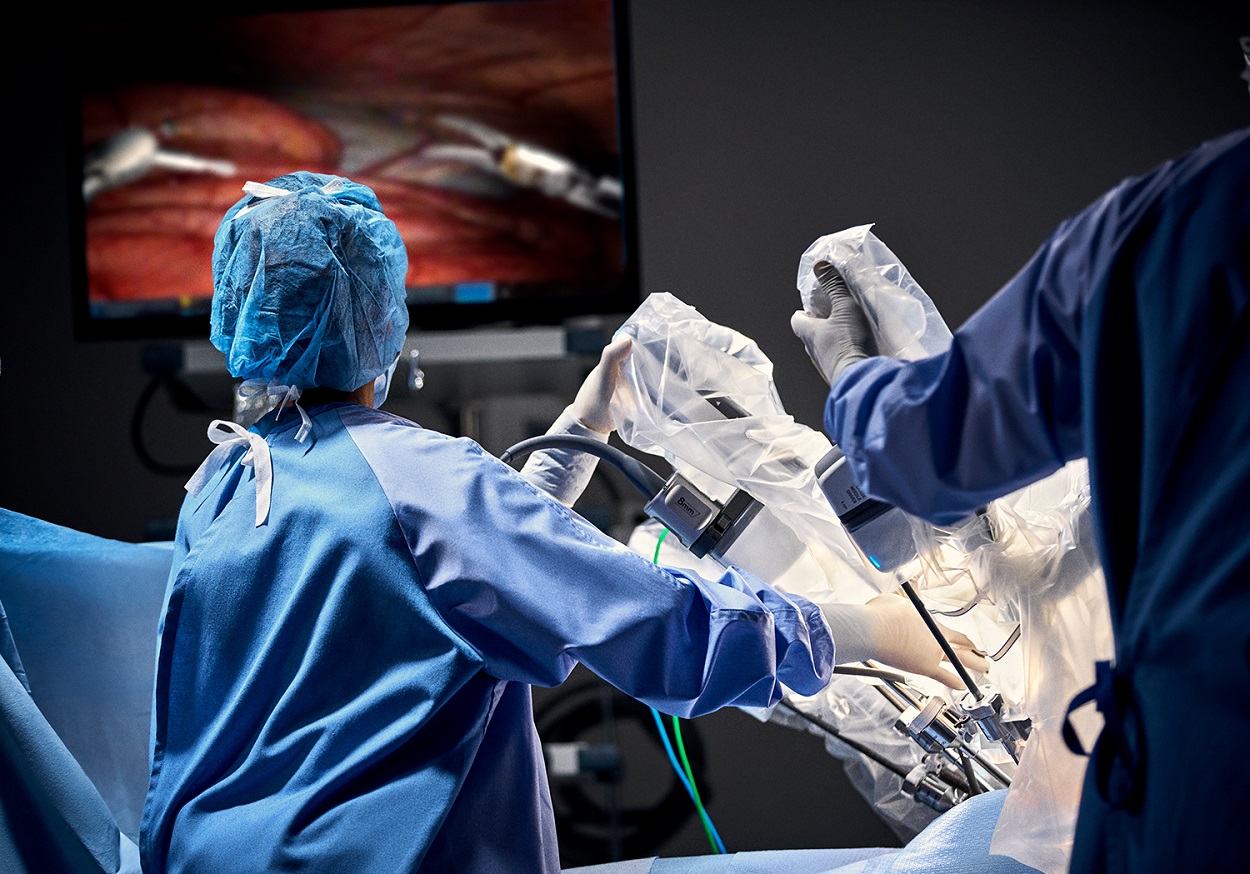

The goal is to offer your patients more precise surgeries, with less postoperative pain and a much faster recovery than the rest of the surgical techniques
The Quirónsalud Torrevieja Hospital has launched the first Advanced Robotic Surgery Unit in the private health sector in the province of Alicante, incorporating the most advanced model of Da Vinci robot. The hospital has extensive experience in robotic surgery, since 15 years ago it was one of the pioneering hospitals in Spain in implementing and training its surgeons in the use of this technology.
The Da Vinci robotic surgical system is designed to offer minimally invasive surgery of the highest level in the approach of complex pathologies in the area of specialties such as Urology, General and Digestive System Surgery, Thoracic Surgery, Oncological Surgery and Gynaecological Surgery.
The robotic surgical system has a camera arm and 3 mechanical arms, and surgical instruments mounted on them that are controlled by the surgeon while sitting in front of a computer console within the operating room itself.
The system also has a vision tower that processes the image, providing a real, magnified and 3D view of the surgical field that allows the surgeon to perform more complex procedures with greater precision, flexibility and control compared to conventional techniques.
As Dr. Rosa Mª Cañón, medical director of the Quirónsalud Torrevieja Hospital, points out, “the incorporation of the Da Vinci robotic system represents a great qualitative advance in the hospital’s surgical services, thanks to which we can offer the best quality of care and experience to our patients, who will benefit from less invasive surgeries with less risk of side effects such as infection, minimal scarring and shorter admissions”.
Urological Robotic Surgery in Alicante
Thanks to the Da Vinci robotic surgery system, Quirónsalud Torrevieja Hospital offers the best treatment and results for patients with prostate cancer who require a radical prostatectomy. “To perform it,” explains Dr. Sven Petry, head of the Urology Service at the Quirónsalud Torrevieja Hospital, “only small incisions in the skin of 0.5 to 1 cm in length are necessary through which we can perform, guided by the high-definition camera, the complete removal of the prostate with an optimal level of precision.”
Regarding the many advantages offered by robotic urological surgery, Dr. Sven Petry highlights a greater recovery of urinary continence, whose success rates thanks to the robot reach 97% compared to 88%, as well as a complete recovery from erectile dysfunction of traditional surgery. Another benefit is the rapid recovery of the patient who, after discharge, can lead a completely normal life, four weeks after the intervention.
The specialist in urological robotic surgery at Hospital Quirónsalud Torrevieja also recommends this technique for the treatment of bladder cancer, kidney cancer or genital prolapse due to its excellent results and postoperative advantages.
Learn more about urologic robotic surgery in this video:
Advanced Robotic Surgery for Malignant and Benign Pathologies
The Da Vinci robotic surgery system has proven to be the best instrument for the multidisciplinary treatment of benign or malignant pathologies. These surgeries include hepatobiliary surgery, oesophageal-gastric surgery, colorectal surgery, metabolic surgery for obesity and abdominal wall surgery.
Within this section of robotic surgery, Dr. Pedro Bretcha, head of the General Surgery and Digestive System Service at Quirónsalud Torrevieja Hospital, highlights the results achieved by this technique in the treatment of colorectal cancer. As Dr. Bretcha explains, “thanks to robotic surgery in the treatment of colorectal cancer, we can perform a much more precise resection of the tumour while maintaining the principles of proper cancer surgery and preserving the surrounding healthy tissue. In addition to achieving less blood loss, a lower risk of infections due to the small size of the incisions made, as well as less postoperative pain, a shorter hospital stay and a quick return to daily activities.”
Learn more about robotic oncology surgery in this video:
Better preservation of pelvic structures thanks to robotic surgery
Another area in which robotic surgery has proven to be the best ally is in the surgical treatment of gynaecological pathologies such as hysterectomy, myomectomy, endometriosis or genital prolapse, in which it stands out “for facilitating more precious movements in narrow and delicate areas such as those that make up the female sexual and reproductive system”. says Dr. Rodolfo Martín Díaz, head of the Gynaecology Service at Quirónsalud Torrevieja Hospital. The benefits of gynaecologic robotic surgery include, but are not limited to, better preservation of pelvic structures, a very significant improvement in urinary incontinence and bowel and bladder control, as well as a much earlier return to daily activities.
Learn more about gynaecologic robotic surgery in this video:
Thoracic surgeries with less hospitalisation thanks to the Da Vinci
Thanks to the minimally invasive approach assisted with Da Vinci robotic surgery, interventions that previously required long hospitalisations for patients with pulmonary pathology can be performed on an almost outpatient basis, with hospital discharge in just 48 hours. “In addition,” says Dr. José Belda, head of the Thoracic Surgery Service at Quirónsalud Torrevieja, “the great precision of the Da Vinci’s interventions allows the treatment of benign and malignant pulmonary pathologies such as lung cancer, including lobectomies and sublobar resections, all without any detriment to oncological radicality”. Other advantages pointed out by the Quirónsalud Torrevieja specialist are less blood loss and a lower risk of postoperative infections.























